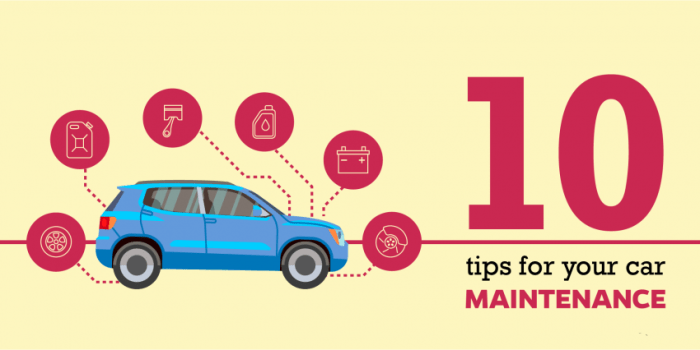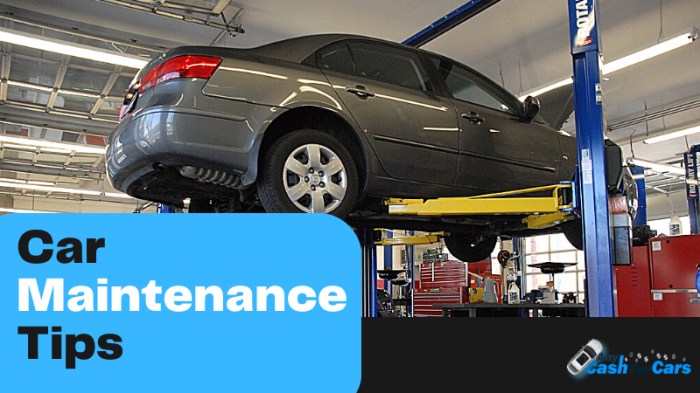Car maintenance tips sets the stage for this enthralling narrative, offering readers a glimpse into a story that is rich in detail with american high school hip style and brimming with originality from the outset.
When it comes to taking care of your wheels, knowing the ins and outs of car maintenance is key to keeping your vehicle in top shape. From changing oil to checking tire pressure, these tips will have you cruising smoothly in no time.
Importance of Car Maintenance: Car Maintenance Tips
Regular car maintenance is crucial for vehicle longevity. By taking care of your car and addressing small issues early on, you can prevent larger, more expensive problems down the road. Neglecting car maintenance can lead to a variety of risks, such as breakdowns, accidents, and decreased fuel efficiency.
Potential Risks of Neglecting Car Maintenance
- Increased risk of breakdowns and being stranded on the road.
- Higher chances of accidents due to faulty brakes, worn-out tires, or other mechanical issues.
- Reduced fuel efficiency, leading to higher fuel costs over time.
- Premature wear and tear on engine components, resulting in costly repairs or replacements.
How Routine Maintenance Can Save Money, Car maintenance tips
- Regular oil changes can help maintain engine performance and prolong its lifespan.
- Replacing air filters and spark plugs as recommended can improve fuel efficiency.
- Checking tire pressure and alignment can prevent uneven wear and extend tire life.
- Routine inspections by a mechanic can catch small issues before they escalate into major problems.
Essential Car Maintenance Tasks

Regular maintenance is key to keeping your car running smoothly and avoiding costly repairs down the road. By performing these essential tasks, you can ensure the longevity and performance of your vehicle.
Regular Oil Changes
One of the most important maintenance tasks for your car is regular oil changes. Oil lubricates the engine, reducing friction and preventing overheating. Over time, oil breaks down and becomes less effective, so it’s crucial to change it regularly.
- Check your owner’s manual for the recommended oil change interval for your specific vehicle.
- Use the correct type of oil for your car – typically indicated by viscosity (e.g. 5W-30).
- Consider factors like driving conditions and mileage when determining how often to change your oil.
Proper Tire Pressure
Checking and maintaining proper tire pressure is essential for safety, fuel efficiency, and tire longevity. Under-inflated tires can lead to decreased gas mileage, uneven tire wear, and even blowouts.
- Refer to your owner’s manual or the sticker inside the driver’s side door jamb for the recommended tire pressure.
- Regularly check tire pressure with a tire gauge and adjust as needed, especially with temperature changes.
- Properly inflated tires provide better handling, braking, and overall performance on the road.
Seasonal Maintenance Tips

When it comes to keeping your car in top shape, seasonal maintenance is key. Different seasons bring different challenges for your vehicle, so it’s important to be prepared. Below are some tips on preparing your car for various seasons.
Checking Coolant Levels Before Summer and Winter
One of the most important things you can do to prepare your car for summer and winter is to check the coolant levels. Coolant is crucial for regulating the temperature of your engine and preventing it from overheating or freezing. Make sure to check and top off the coolant levels before the extreme temperatures hit.
Preparing Your Car for Winter Driving Conditions
- Ensure your tires are properly inflated and have good tread depth to provide traction on icy roads.
- Check your battery and make sure it’s in good condition to handle the increased strain in cold weather.
- Keep an emergency kit in your car with essentials like a blanket, flashlight, and extra warm clothing in case you get stranded in the snow.
- Switch to winter-grade oil to ensure proper lubrication in colder temperatures.
- Consider installing winter tires for better grip on snow and ice.
DIY vs. Professional Maintenance
When it comes to car maintenance, the age-old debate between doing it yourself (DIY) or seeking professional help continues. Both options have their advantages and disadvantages, so let’s dive into the comparison.
Benefits of DIY Car Maintenance
- Cost-effective: Performing basic maintenance tasks like changing oil, air filters, or wiper blades can save you money on labor costs.
- Convenience: You can work on your car at your own pace and schedule without having to book appointments or wait for availability.
- Learning experience: DIY maintenance can help you understand your car better, leading to a stronger connection with your vehicle.
Tasks Safe and Easy for Car Owners
- Replacing light bulbs
- Changing engine air filters
- Checking and topping off fluids
- Replacing windshield wipers
When to Seek Professional Help
- Complex repairs: Issues like engine problems, transmission repairs, or electrical system malfunctions are best left to professionals with specialized tools and expertise.
- Safety concerns: Tasks involving lifting the car, handling hazardous materials, or working with intricate components should be done by trained professionals to avoid accidents.
- Warranty protection: If your car is still under warranty, getting maintenance done by authorized service centers can help preserve your coverage.



